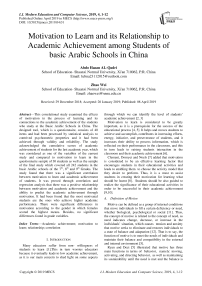Motivation to learn and its relationship to academic achievement among students of basic Arabic schools in china
Автор: Abdo Hasan AL-Qadri, Zhao Wei
Журнал: International Journal of Modern Education and Computer Science @ijmecs
Статья в выпуске: 4 vol.11, 2019 года.
Бесплатный доступ
This correlational study examined the effects of motivation in the process of learning and its connections to the academic achievement of the students who study at the Basic Arabic Schools in China. The designed tool, which is a questionnaire, consists of 40 items and had been processed by statistical analysis to contrived psychometric properties and it had been achieved through validity and reliability. The study acknowledged the cumulative scores of academic achievement of students for the last academic year, which was considered as one of the variables of the current study and compared to motivation to learn in the questionnaire sample of 30 students as well as the sample of the final study which covered all 242 students in the basic Arabic schools of the 7th, 8th and 9th Grades. The study found that there was a significant correlation between motivation to learn and academic achievement of students. It was proved through correlation and regression analysis that there was a positive relationship between motivation and academic achievement and the ability to predict the academic achievement through motivation. It had been found that the most motivated students are the ones who achieve higher academic performance. There were significant differences in motivation according to the gender in which females scored the highest means. Besides, no significant differences found in grade variables.
Academic achievement, motivation to learn, relationship, correlation
Короткий адрес: https://sciup.org/15016840
IDR: 15016840 | DOI: 10.5815/ijmecs.2019.04.01
Текст научной статьи Motivation to learn and its relationship to academic achievement among students of basic Arabic schools in china
Published Online April 2019 in MECS DOI: 10.5815/ijmecs.2019.04.01
Many educators suffer from non- willingness of students to learn [1].This in turn worries educators because it eventually leads to low academic achievement, as it is our main concern to shed light on some aspects through which we can identify the level of students’ academic achievement [2, 3]
Motivation to learn is considered to be greatly important, as it is a prerequisite for the success of the educational process [4, 5]. It helps and moves students to achieve and accomplish, contributes in increasing efforts, energy, initiative, and perseverance of students, and it increases their ability to process information, which is reflected on their performance in the classroom, and this in turn leads to raising students interaction in the classroom and their academic achievement [6].
Clement, Dornyei and Noels [7] added that motivation is considered to be an effective learning factor that encourages students in their educational activities and leads to enabling them to choose the activity model that they desire to perform. Thus, it is a must to assist students in creating their motivation for learning what should be learnt [8]. Students should be also guided to realize the significance of their educational activities in order to be successful in their academic achievement [9,10].
-
A. Definition of Motive
Motive can be defined as a group of internal conditions that move individuals to fill a certain deficiency or need, whether biological, psychological or social [11]. Thus, the concept of motive is related to the concept of need, as need indicates change, decrease, or increase in the individuals’ situation, which causes tension and anxiety that motive seeks to eliminate and restores individuals to a state of balance and adaptation [12]. That is to say, the function of motive is to meet the needs of individuals and maintain their balance and compatibility in the external and internal environment [5].
Ryan and Deci [5] illustrated that motive has three main functions in terms of behavior, namely: moving, activating, and directing behavior, as well as maintaining its sustainability until the need is met and the balance is restored. The term motivation also refers to an internal psychological state that moves individuals to conduct a particular behavior in a specific direction to achieve a certain goal. In case individuals could not achieve such a goal, they feel distressed and tensioned until achieving it [13, 14].
Some researchers pointed out that motivation is not an abstract that can be directly observed, but it is a condition in the human being whose existence is shown in the behavior patterns observed. Thus, several behavior patterns may be constituted of a single motive. Moreover, dividing motivation into different motives does not imply that such motives are different from each other, as it is a state of tension that makes human being active [15].
-
B. Motivation to Learn
Psychological studies are concerned with motivation and the factors and circumstances that keep students motivated. The topic of motivation is considered complicated in terms of diverse parties concerned, either in terms of their requirements in the classroom and the appropriate educational methods that include educational learning experiences which stimulate students to get involved in the educational learning attitude on one hand, and the different psychological trends that are dealt with in the light of the intellectual vision of motivation on the other hand, whether through behavioral, cognitive, or human trends, or through analytical school of psychology. Therefore, motivation to learn can be defined in the light of its general concept as follows:
Biehler and Snowman [16] defined learning motivation as:" The internal or external state of learners that moves their behavior and claims and which makes them continue, and keep them going towards a specific goal or purpose."
-
C. The Relationship between Motivation and Academic Achievement
Most studies point out that motivation and encouragement stimulate students to achieve. It was also pointed out that children who are raised under high parental protection, have a higher learning motivation. In addition, challenges increase their ambition, stimulate their imagination and production, and increase their academic achievement [17,18,19].
On the other hand, learning motivation plays an important and influential role in raising the level of individuals performance and productivity in the various fields and activities that they experience, especially in the field of academic achievement. Moreover, differences in the academic achievement of students can be demonstrated by means of motivation level of students as most studies confirmed that the higher the level of learning motivation, the higher the academic achievement of students [20].
Academic achievement depends mainly on learning, education, orientation, and motivation. Murray [21] stated: "Motivation of learning is the constant desire to strive for success, to accomplish difficult tasks, to efficiently overcome obstacles, with the least amount of effort and time, and with the best level of learning." [22].
Furthermore, there are studies stressed the importance of motivation to learn in increasing academic achievement and success and found a fundamental relationship between motivation for learning and learning achievement [6] as motivation to learn is an internal situation of learners which moves their behavior and performance and directs them to achieve a specific goal, such as achieving the highest results that lead to success, so that success of the educational process depends on the effectiveness of the students and their motivation to learn [23]. Also, many studies claimed that student's academic achievement is important in order to enhance teaching and learning method, student needs assessment and students learning behavior [24,25].
As mentioned above, motivation is one of the most significant ways to achieve educational objectives because it is considered one of the key factors that help in gaining knowledge and understanding. It can be said that perhaps the most important principle in learning is the existence of motivation [26, 27].
-
D. The Relationship between Motivation and Learning
Motivation has a direct relationship with students behavior and their learning, as several useful impacts of motivation can be observed in students learning and behavior. Ames; Dev; Bester & Brand;
-
- Motivation moves behavior of students towards certain goals, hence motivation affects the choices of students.
-
- Motivation increases initiating and persisting on activities, so it creates in them the desire to continue and to persist in the performance of tasks, when obstacles takes place or when they become frustrated while they are performing such tasks.
-
- Motivation assists student to process information and affects the manner and quantity of processing information. Highly motivated Students are more attentive to the teacher, and thus acquires more information in short-term memory and long-term memory. Moreover, such highly motivated students seek help from the teacher or from other sources when they are in need as they attempt to acquire more knowledge, to be more focused on meaningful learning, and not to care about simply keeping information at the deaf level.
The academic achievement of students is not recognized without understanding their motivation to learn through a framework that asserts the goals of learners. In other words, it can be said that the academic achievement of students in the classroom is an indication of many factors, some of which are related to motivation and the other factors are related to the environmental conditions. This study intends to discover the relationship between motivation to learn and academic achievement of Arabic school students in china because of the scarcity of such studies in this respect. It specifically recognizes the characteristics affecting academic achievement of these students by their motivation of learning and not to forget to mention the cultural differences of these students in comparison to the Chinese culture. That is why this study is considered to be as one of the most important studies.
-
E. Aims of the Study
-
• The main aim of this study is to find the relationship between motivation to learn of students of basic Arabic schools and their academic achievement.
-
• Find the values of (R- square, β, T- value and F-value) by using regression analysis to predict the academic achievement through the motivation to learn.
-
• Identify whether there are any statistical significant differences between the research variables (Gender and Grade).
-
II. Methodology
-
A. Study Group
This correlational study covered all 242 students in the basic Arabic schools (106 males (44%) and 136 females (56%) for the 7th, 8th and 9th Grades in China. The age of the sample ranged from 13 to 16 years old. The random sampling technique was adopted to select the sample study.
-
B. Tool of the Research
The tool, which used in this study, based on many educational literatures and previous studies on the subject such as the study of Broussard and Ghenghesh [33, 34]. The exploratory study of the questionnaire has been done to verify its psychometric properties (validity and reliability) for 30 students. In order to validate the tool, it was presented to specialists and experts in the field.
Table 1. Validity of Questionnaire Items
Criterion validity was also studied to find out the correlation between the student's motivation to learn and their academic achievement. The correlation value is (0.613) which indicates that the increasing in student’s motivation to learn leads to the highest academic achievement of students.
Table 2. Criterion Validity of the Questionnaire
|
Pearson Correlation |
Motivation score |
Academic Achievement Score |
|
Motivation score |
1 |
0.613** |
|
Academic Achievement Score |
0.613** |
1 |
|
Number of Students |
30 |
30 |
|
** (ρ<0.01) |
||
Cronbach’s alpha was calculated based on the four was (0.850) which is suitable and acceptable ratios for dimensions of the tool. The Cronbach’s alpha for whole the test.
dimensions was (α =0.846) and the Guttman Split-Half
|
Table 3. Reliability of the Questionnaire |
|||
|
Dimensions |
No. of Items |
Cronbach's Alpha(α) |
Guttman Split-Half |
|
1st dimension |
10 |
0.743** |
0.771** |
|
2ed dimension |
10 |
0.677** |
0.723** |
|
3rd dimension |
10 |
0.600** |
0.645** |
|
4th dimension |
10 |
0.707** |
0.731** |
|
Whole dimensions |
40 |
0.846** |
0.850** |
|
** ( ρ<0.01) |
|||
-
III. Results and Discussion
Sekyere [35] who found that there is a significant correlation between achievement and motivation scores of the students. A study by Goldberg and Cornell [36] revealed statistically significant correlation between motivation and academic achievement. Mnyandu [37] found a significant positive correlation between motivation and learners’ achievement.
Table 4. Correlation among Dimensions of Motivation to learn and the Academic Achievement
|
Variables |
Sharing with others |
Effectiveness |
Interest in school activity |
Take responsibility |
Academic Achievement |
Whole Dimensions |
|
Sharing with others |
- |
|||||
|
Effectiveness |
.472** |
- |
||||
|
Interest in school activity |
.401** |
.391** |
- |
|||
|
Taking responsibility |
.420** |
.483** |
.451** |
- |
||
|
Academic Achievement |
.682** |
.507** |
.591** |
.542** |
- |
|
|
Whole Dimensions |
.743** |
.806** |
.720** |
.766** |
.755** |
- |
|
** (ρ<0.01) |
||||||
Table 5 shows the mean score of academic achievement (M=79.314, SD= 9.091) and the mean scores for each of the four dimensions of motivation to learn which ranged from (36.099 to 39.645). The mean of the whole motivation dimensions was (M= 151.124, SD = 21.129), which indicates that students were motivated to learn and they displayed a high level of interest in school activity (M= 39.645, SD= 6.400).
Table 5. Mean and Standard Deviation of Motivation to learn and the Academic Achievement
|
Variables |
Number of Participants= 242 |
|
|
Mean |
SD |
|
|
Academic Achievement |
79.314 |
9.091 |
|
Sharing with others |
38.207 |
6.461 |
|
Effectiveness |
37.174 |
8.295 |
|
Interest in school activity |
39.645 |
6.400 |
|
Taking responsibility |
36.099 |
6.577 |
|
Motivation to learn (whole dimensions) |
151.124 |
21.129 |
In order to predict the academic achievement by motivation to learn, the regression analysis was used. The four dimensions of motivation to learn are tested as shown in (Table 6) and Fig 1,2,3,4,5. The results revealed that there is a positive relation between motivation to learn with academic achievement and the relationship is statistically significant. The F value clarifies the significance between the whole dimensions of motivation to learn and academic achievement (R Square = 0.570), (β = 0.755) and (F value = 318.349). So, it is possible to predict the academic achievement scores through the student’s motivation to learn. The values of the first dimension “sharing with others” is (R Square = 0.465), (β =0.682) and (T value =14.449). The second dimension “effectiveness” (R Square = 0.257), (β = 0.507) and (T value =9.108). The third dimension “interest in school activity” (R Square = 0.349), (β = 0.591) and (T value = 11.338). The fourth dimension “taking responsibility” (R Square = 0.294), (β = 0.542) and (T value = 9.989). From (Table 6) below T value clarifies the significance between each dimension of motivation to learn and academic achievement. So, there is a noticeable effect of motivation with all its dimensions on the academic achievement.
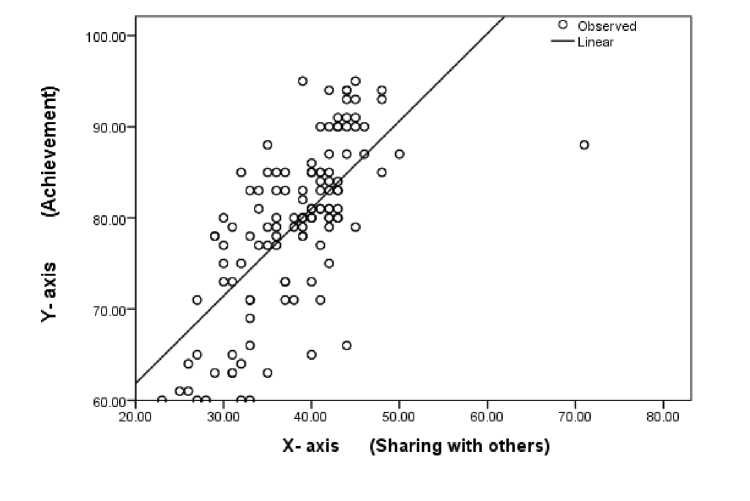
Fig.1. Prediction of the Academic Achievement through the Sharing with others
Y-axis (Achievement
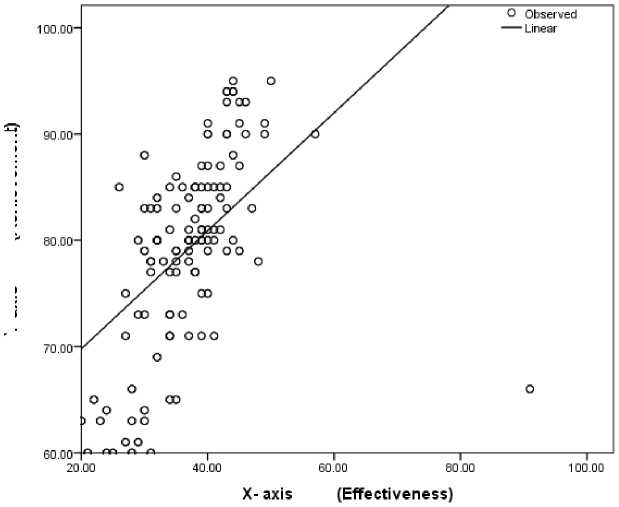
Fig.2. Prediction of the Academic achievement through effectiveness
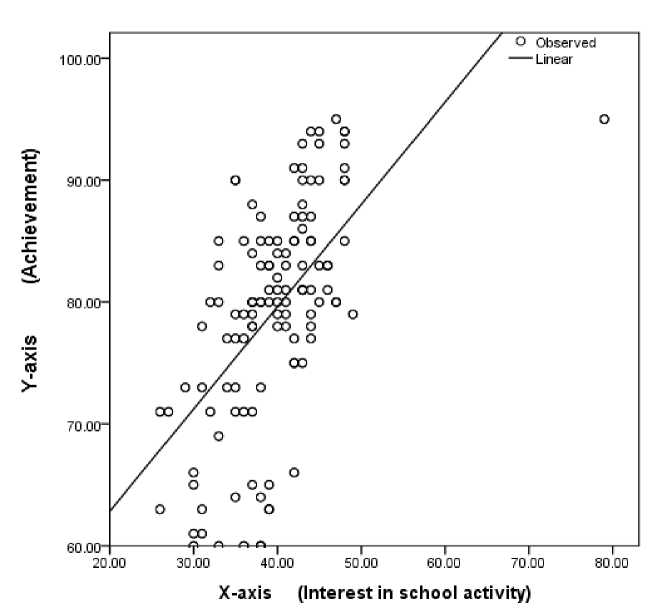
Fig. 3. Prediction of the Academic Achievement through the Interest in School Activity
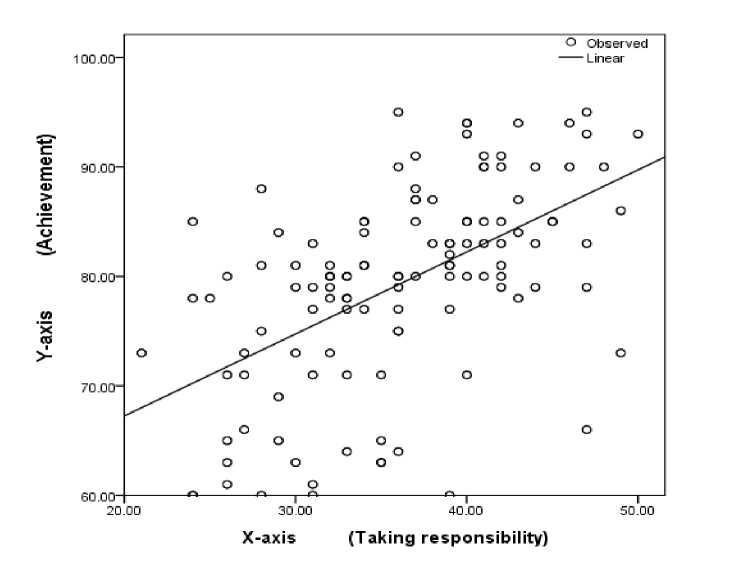
Fig.4. Prediction of the Academic Achievement through Taking Responsibility
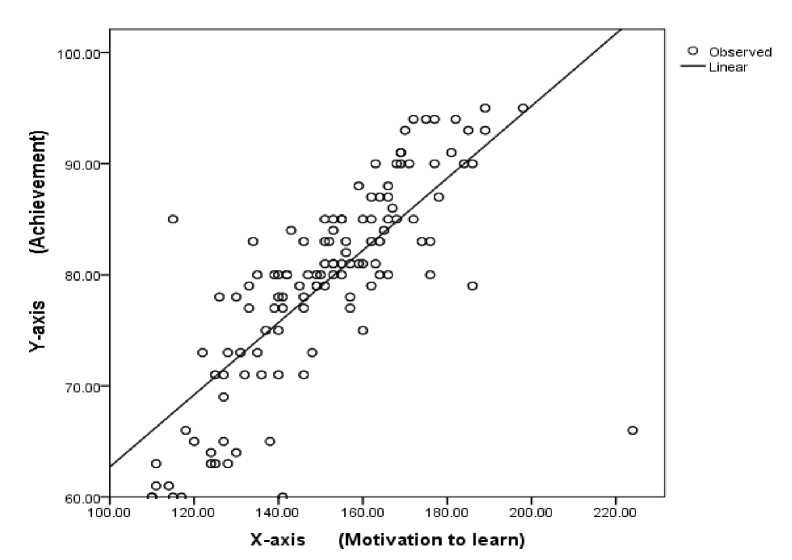
Fig.5. Prediction of the Academic Achievement through motivation to learn (whole dimensions)
Table 6. Regression Analysis for Prediction the Academic Achievement on the basis of Motivation to learn
|
Variables |
R Square |
β |
T value |
F value |
ρ |
|
Sharing with others |
0.465 |
0.682 |
14.449*** |
ــــ |
.000 |
|
Effectiveness |
0.257 |
0.507 |
9.108*** |
ــــ |
.000 |
|
Interest in school activity |
0.349 |
0.591 |
11.338*** |
ــــ |
.000 |
|
Taking responsibility |
0.294 |
0.542 |
9.989*** |
ــــ |
.000 |
|
Motivation to learn (whole dimensions) |
0.570 |
0.755 |
ـــــ |
318.349*** |
.000 |
|
*** (ρ<0.001) |
|||||
Gender differences in motivation to learn were analyzed by using independent t- test and the results are presented in (Table 7 and Fig 6). As the means indicate, both males and females have scored high level in third dimension ‘Interest in school activity’ but the highest level was in favor of female students. There were statistically significant gender differences among the four dimensions. This finding concurred with studies of Ergene; Jegede; Jen & Yong; McCarthy & Widanski;
Table 7. The Difference between the Mean Scores of Academic Achievement and Motivation to learn of Male and Female Students
|
Dimensions |
Gender N Mean SD T DF ρ |
|
Sharing with others |
Male 106 33.302 11.168 3.927 *** 240 .000 Female 136 37.889 6.894 |
|
Effectiveness |
Male 106 32.802 14.871 2.686 ** 240 .008 Female 136 36.588 6.199 |
|
Interest in school activity |
Male 106 34.528 10.335 4.852 *** 240 .000 Female 136 40.015 7.235 |
|
Taking responsibility |
Male 106 33.038 10.176 2.469 ** 240 .010 Female 136 35.787 7.126 |
|
Overall |
Male 106 129.189 43.457 4.443*** 240 .000 Female 136 148.721 24.046 |
|
Achievement |
Male 106 75.972 11.199 2.626** 240 .009 Female 136 79.257 8.257 |
(ρ<0.001) , ** (ρ≤0.01)

— ♦ — Male
— ■ — Female
Sharing with Effectiveness Interest in Taking others school activity responsibility
-
Fig.6. Means of the Four Dimensions for Gender Variable
Table 8. The Difference between the Mean Scores of Motivation to learn and Academic Achievement according to the Grade Variable
|
Dimensions |
Grade |
N |
Mean |
SD |
Sum of Squares |
Mean Square |
DF |
F |
ρ |
|
|
Sharing with others |
Seventh |
96 |
37.312 |
5.643 |
Between Groups |
213.616 |
106.808 |
2 |
||
|
Eighth |
78 |
39.512 |
7.977 |
Within Groups |
9846.053 |
41.197 |
239 |
2.593 |
.077 |
|
|
Ninth |
68 |
37.971 |
5.356 |
Total |
10059.669 |
241 |
||||
|
Total |
242 |
38.207 |
6.461 |
|||||||
|
Seventh |
96 |
36.417 |
6.964 |
Between Groups |
398.369 |
199.185 |
2 |
|||
|
Effectiveness |
Eighth |
78 |
39.026 |
10.456 |
Within Groups |
16184.341 |
67.717 |
239 |
2.931 |
.057 |
|
Ninth |
68 |
36.118 |
6.867 |
Total |
16582.711 |
241 |
||||
|
Total |
242 |
37.174 |
8.295 |
|||||||
|
Interest in school activity |
Seventh |
96 |
38.792 |
5.479 |
Between Groups |
228.421 |
114.210 |
2 |
||
|
Eighth |
78 |
41.026 |
8.279 |
Within Groups |
9643.017 |
40.347 |
239 |
2.831 |
.061 |
|
|
Ninth |
68 |
39.2647 |
4.752 |
Total |
9871.438 |
241 |
||||
|
Total |
242 |
39.645 |
6.400 |
|||||||
|
Taking responsibility |
Seventh |
96 |
35.438 |
6.138 |
Between Groups |
108.729 |
54.365 |
2 |
||
|
Eighth |
78 |
36.051 |
7.178 |
Within Groups |
10316.890 |
43.167 |
239 |
1.259 |
.286 |
|
|
Ninth |
68 |
37.088 |
6.429 |
Total |
10425.620 |
241 |
||||
|
Total |
242 |
36.099 |
6.577 |
|||||||
|
Seventh |
96 |
147.958 |
18.381 |
Between Groups |
2567.221 |
1283.611 |
2 |
|||
|
Overall |
Eighth |
78 |
155.615 |
25.368 |
Within Groups |
105031.060 |
439.461 |
239 |
2.921 |
.056 |
|
Ninth |
68 |
150.441 |
18.682 |
Total |
107598.281 |
241 |
||||
|
Total |
242 |
151.124 |
21.130 |
|||||||
|
Seventh |
96 |
78.291 |
8.657 |
Between Groups |
227.309 |
113.655 |
2 |
|||
|
achievement |
Eighth |
78 |
80.590 |
9.741 |
Within Groups |
19688.827 |
82.380 |
239 |
1.380 |
.254 |
|
Ninth |
68 |
79.294 |
8.862 |
Total |
19916.132 |
241 |
||||
|
Total |
242 |
79.314 |
9.091 |
|||||||
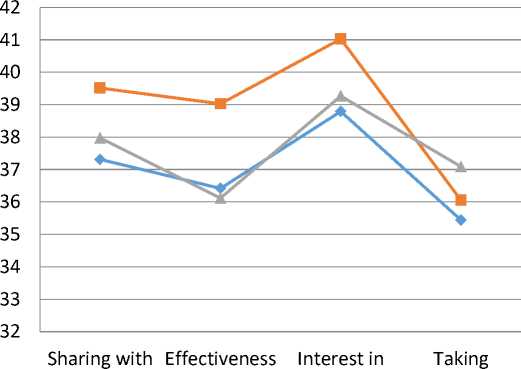
— ♦ —Seventh
— ■ — Eighth
—*— Ninth
others school responsibility activity
-
Fig.7. Means of the Four Dimensions for Grade Variable
-
IV. Conclusion
In the current study, it has been found that there is a significant correlation between motivation to learn and academic achievement of the students’ scores for the last academic year (2017-2018). The study defined the predictive value of academic achievement through motivation to learn and through each dimension of motivation specifically “sharing with others”, “Effectiveness”, “Interest in school activity” and “Taking responsibility”. Also, it has been recognized the
characteristics affecting academic achievement of these students by their motivation of learning. The study emphasizes that there are motives, which provide students with the needed strength to use the best methods to achieve the maximum potential to improve their scientific performance. The results revealed that the third dimension "Interest in school activity" was the most motivated for students (grade eighth).
Список литературы Motivation to learn and its relationship to academic achievement among students of basic Arabic schools in china
- E. Deci, R. Ryan, “Self-determination theory: a macro-theory of human motivation, development and health”, Canadian Psychology, vol. 49, no. 3, pp. 182-185, 2008. https://doi.10.1037/a0012801
- A. Bueschel, “Listening to Students About Learning. California: The Carnegie Foundation for the Advancement of Teaching” 2008.
- M.Gagne, “The role of autonomy support and autonomy orientation in pro-social behavior engagement”, Motivation and Emotion, vol. 27, no. 3, pp. 199-223, 2003.
- E. Deci, R. Vallerand, L. Pelletier, R. Ryan, “Motivation and education: the self – determination perspective”, Educational Psychologist, vol.26, no. 384, 325 – 246, 1991.
- R. Ryan, E. Deci, “Intrinsic and extrinsic motivations: Classic definitions and new directions”, Contemporary Educational Psychology, vol. 25, pp. 54-67, 2000. https://doi:10.1006/ceps.1999.1020
- F. Koca, “Motivation to learn and teacher–student relationship”, Journal of International Education and Leadership, vol. 6, no. 2, 2016.
- R. Clement, Z. Dornyei, K. Noels, “Motivation, self-confidence, and group cohesion in the foreign language classroom”, Language Learning, vol. 44, no. 3, pp. 417 – 448, 1994.
- T. Seifert, “Understanding student motivation”, Educational Research, vol. 46, no. 2, pp. 137-149, 2004. https://doi.org/10.1080/0013188042000222421
- Z. Dornyei, “Creating a motivating classroom environment”, New York: New York: Springer Science-Business Media, Inc, 2007.
- J. Bradley, P. Conway, “A dual step transfer model: Sport and non‐sport extracurricular activities and the enhancement of academic achievement”, British Educational Research Journal, vol. 2, no.4, pp. 703-728, 2016. https://doi.org/10.1002/berj.3232
- E. Mensah, K. Tawiah, “Employee Motivation and Work Performance: A comparative study of mining companies in Ghana”, Journal of Industrial Engineering and Management, vol.9, no. 2, pp. 255-309, 2016 http://dx.doi.org/10.3926/jiem.1530
- C. Dweck, “Self-theories. Their role in motivation. Personality and development”, New York: Psychology Press, 1999.
- S. Aftab, S. Riaz, S. “Impact of grade sensitivity on learning motivation and academic performance”, International Journal of Educational and Pedagogical Sciences, vol.10, no. 7, 2016. https://doi:10.1999/1307-6892/53128
- E. Kyndt, F. Dochy, K. Struyven, E. Cascallar, “The direct and indirect effect of motivation for learning on students' approaches to learning through the perceptions of workload and task complexity”, Higher Education Research & Development, vol. 30, no. 2, pp. 135-150, 2011. https://doi.org/10.1080/07294360.2010.501329
- F. Guay, “The virtue of culture in understanding motivation at school: Commentary on the special issue on culture and motivation”, British Journal of Educational Psychology, vol. 68, no. 1, pp. 154-160, 2016. https://doi.org/10.1111/bjep.12105
- R. Biehler, J. Snowman, “Psychology applied to teaching (7th ed.)”, Boston: Houghton Mifflin Company, 1993.
- S. Batchelor, “Relationships Between Parent Involvement and the Academic Achievement of Disadvantaged Children : What Matters? For Whom Does it Matter? How Does it Work? “, PhD dissertation. Australia: Griffith University, 2013.
- L. Hornstra, M. Majoor, T. Peetsma, “Achievement goal profiles and developments in effort and achievement in upper elementary school”, British Journal of Educational Psychology, vol. 87no. 4, pp. 606-629, 2017. https://doi.org/10.1111/bjep.12167
- J. Hughes, O. Kwok, “Influence of student–teacher and parent–teacher relationships on lower achieving readers’ engagement and achievement in the primary grades”, Journal of Education Psychology, vol. 99, no. 1, pp. 39–5, 2007. https://doi10.1037/0022-0663.99.1.39
- I. Naile, J. Selesho, “The role of leadership in employee motivation”, Mediterranean Journal of Social Sciences, vol. 5, no.3, 2014. http://dx.doi.10.5901/mjss.2014.v5n3p175
- H. Murray, “Explorations in personality”, New York: Oxford University Press, 1938.
- K. Murayama, A. Elliot, “The Joint influence of personal achievement goals and classroom goal structures on achievement-relevant outcomes”, Journal of Educational Psychology, vol.101, no. 2, pp. 432– 447, 2009. http://dx.doi.org/10.1037/a0014221
- K. Singh, “Study of achievement motivation in relation to academic achievement of students”, International Journal of Educational Planning & Administration, vol.1, no. 2, pp. 161-171, 2011. https://www.ripublication.com/ijepa.htm
- L. Affendey, I. Paris, N. Mustapha, MD. Sulaiman Z. Muda, “Ranking of Influencing Factors in Predicting Students’ Academic Performance”, Information Technology Journal, vol. 9, no. 4, pp. 832-837, 2010.
- D. Delen, “A comparative analysis of machine learning techniques for student retention management”, Decision Support Systems, no.49, pp. 498 -506, 2010. DOI: 10.1016/j.dss.2010.06.003
- G. Bossaert, E. Doumen, K. Buyse, Verschueren, “Predicting students academic achievement after the transition to first grade: A two-year longitudinal study". Journal of Applied Developmental Psychology, vol. 32, pp. 47–57, 2011. https://doi:10.1016/j.appdev.2010.12.002
- S. Broussard, M. Garrison, “The Relationship Between Classroom Motivation and Academic Achievement in Elementary-School-Aged Children”, Family and consumer sciences research journal, vol. 3, pp. 106-120, 2004
- C. Ames, “Classrooms: goals, structures, and student motivation”, Journal of Educational Psychology, vol. 84, no. 3, pp. 261-271, 1992. Accessed 18 Dec 1991.
- P. Dev, “Intrinsic motivation and academic achievement: What does their relationship imply for the classroom teacher?”, Remedial and Special Education, vol. 18, no. 1, pp. 12-19, 1997. https://doi.org/10.1177/074193259701800104
- G. Bester, L. Brand, “The effect of technology on learner attention and achievement in the classroom”, South African Journal of Education, vol. 33, no. 2, 2013. https://doi:10.15700/saje.v33n2a405
- F. Guay, J. Chanal, CF. Ratelle, HW. Marsh, S. Larose, M. Boivin, “Intrinsic, identified, and controlled types of motivation for school subjects in young elementary school children”, British Journal of Educational Psychology, vol. 80, no. 4, pp. 711-735, 2010. https://doi.10.1348/000709910X499084
- Z. Ghaedi, B. Jam, “Relationship between learning styles and motivation for higher education in EFL students”, Theory and Practice in Language Studies, vol 4, no.6, pp 1232-1237, 2014. https://doi:10.4304/tpls.4.6.1232-1237
- S. Broussard, “The relationship between classroom motivation and academic achievement in first and third graders”, MSc dissertation. USA: Louisiana State University,2002.
- P. Ghenghesh, “The Motivation of L2 learners: Does it decrease with age?”, English Language Teaching, vol.3, no. 1, pp. 128-141, 2010.
- A. Ofori, E. Nsiah-Gyabaah, A. Sekyere, “Relationship between motivation, academic self-concept and academic achievement amongst students at a Ghanaian technical university”, International Journal of Human Resource Studies, vol. 7, no. 1, 2017.
- M. Goldberg, D. Cornell, D “The influence of intrinsic motivation and self-concept on academic achievement in second-and third-grade students”, Journal for the Education of the Gifted, no. 2, pp. 179-205, 1998. http://dx.doi.org/10.1177/016235329802100204
- P. Mnyandu, “The relations between self-determination, achievement motivation and academic achievement”, MEd Dissertation. Pretoria, University of South Africa, 2001.
- T. Ergene, “ The relationships among test anxiety, study habits, achievement, motivation and academic performance among Turkish high school students”, Education and Science, vol.36, no. 160, pp. 320-330, 2011.
- S. Jegede, “Students’ anxiety towards the learning of chemistry in some Nigerian secondary schools”, Educational Research and Review, vol. 2, no. 7, pp. 193-197, 2007.
- C. Jen, B. Yong, “Secondary school students’ motivation and achievement in combined science”, US-China Education Review, vol. 3, no. 4, pp. 213-228, 2013.
- W. McCarthy, B. Widanski, “Assessment of chemistry anxiety in a two year college” Journal of Chemical Education, vol. 86, no. 12, pp. 1447-1449, 2009.
- R. Awan, I. Noureen, A. Naz, “A study of relationship between achievement motivation, self-concept and achievement in English and Mathematics at secondary level”, International Education Studies, vol.4, no. 3, pp. 72-79, 2011. https://doi:10.5539/ies.v4n3p72
- G. Eymur, O. Geban, “An investigation of the relationship between motivation and academic achievement of preservice Chemistry teachers. Education and Science”, vol.36, no. 161, pp. 246-255, 2011.
- L. Brophy, “Motivating students to learn”, New Jersey: Lawrence Erlbaum Associates. 1998.
- J. Coleman, A. Galaczi, L. Astruc, “Motivation of UK school pupils towards foreign languages: a large-scale survey at Key Stage 3”, Language Learning Journal, vol. 35, no. 2, pp. 245–280, 2007. https://doi.org/10.1080/09571730701599252
- M. Williams, R Burden, V. Lanvers, “French is the language of love and stuff’: Student perceptions of issues related to motivation in learning a foreign language”, British Educational Research Journal, vol.28, no. 4, pp. 503-28, 2002. https://doi.10.1080/0141192022000005805
- E. Palicz, “Motivation to learn English in a bilingual school context” MSc dissertation. Budapest: Eotvos University, 1994.

